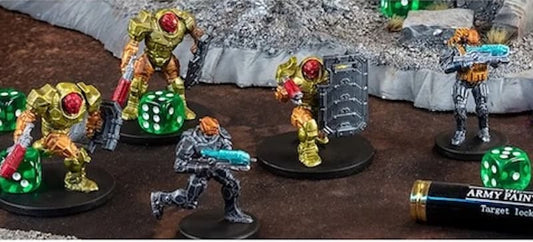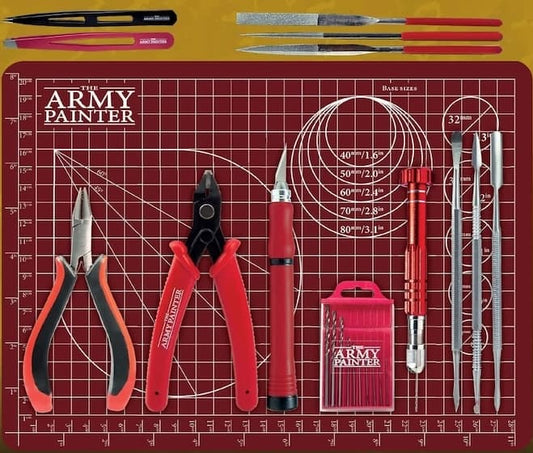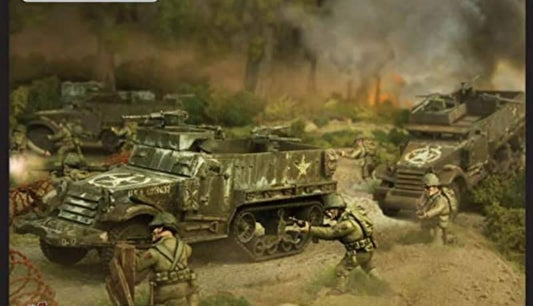Tabletop wargaming: sounds fascinating, right? It’s like chess but with a historical twist. You move pieces, plan tactics, and relive history's big moments. Its strategy meets storytelling.
Why the buzz? Well, each game is a trip back in time. Players become generals, making decisions that change outcomes. And the best part? No time machine needed.
So, if you're new and curious, here's a glimpse into why so many people around the world are drawn to tabletop wargames.
1. Historical Narratives and Detail
Tabletop wargaming takes players on a journey through history's most defining moments. When engaging with historical tabletop wargames like Bolt Action or Flames of War, players craft, interpret, and breathe life into historical narratives rooted in real-life battles.
Imagine stepping into the boots of generals from times long past. Each decision you make becomes a page from history, either faithfully retold or given a fresh spin. The events of D-Day, the skirmishes of World War II, the grand strategies of iconic commanders—all transform into stories waiting for your touch.
What sets these historical wargames apart is their dedication to the past with remarkable attention to detail. The uniforms, the weapons, and every other detail of historical wargaming miniatures heighten authenticity. This perfect mix of storytelling and immersion ensures that every gaming session adds a new chapter to history's tales.
2. Creative Thinking
Tabletop wargaming is where strategy meets wild creativity. Players recreate battles, sure, but they also ask, "What if?" They twist scenarios. They envision new outcomes. Strategies emerge from spontaneous bursts of inspiration rather than manuals.
Pre-defined settings might set the scene, but players are the maestros. They decide if the game follows the established narrative or carves a new path. Every game round, tales are reborn, reshaped, and retold. And in this fusion of rules and imagination, tabletop wargaming finds its charm.
3. Mechanics that Captivate
Ever caught yourself wondering how a different strategy might've changed the outcome of D-Day? Or perhaps pondered a different tactical approach for the Romans at the Battle of Teutoburg Forest? Historical tabletop wargames challenge us to reconsider the annals of history. While the mechanics are firmly rooted in historical accuracy, they offer players the room to explore alternative outcomes and strategies.
What makes this experience so enthralling is its balance of fact and fiction. History sets the stage, but the script? Well, that's open to your interpretation. As you position units and rely on that crucial dice roll, bear in mind: in this world, history is more a starting point than a destination. Because while hindsight informs, foresight lets you reimagine and play.
4. Building Bonds and Community
Tabletop wargames foster real connections. Players share strategies, give painting tips, and swap stories of epic game plays. Take Warlord Games Bolt Action as an example. It plunges players deep into World War II's complexities. They team up to bring historic battles to life and engage in lively debates over unit tactics. This shared passion turns casual games into lasting bonds.
Another gem from Warlord Games is Hail Caesar. Here, players step into ancient times. They command Roman legions or lead fierce Celtic tribes. Talks shift from battlefield tactics to stories of legendary warriors and vast empires. Players don't just sit together—they embark on a journey through history. Through these miniature clashes, they forge friendships, creating memories that go beyond the game board.
5. Immersive and Personal Art
Have a thing for miniature painting? Tabletop wargaming could be your calling. Every brushstroke crafts a story. Infantrymen stand vigilant, war machines dominate, and players infuse life into every figure.
The immersion goes deep. As you paint, history unfurls before you. The colors you choose, the textures you create, echo battles of bygone eras. Each miniature becomes a tribute to legendary moments and figures. Your hand guides them, giving them form and purpose. And when these miniatures take their place on the battlefield, they stand as powerful testaments to your artistry, passion, and connection to the sagas of old.
6. Building Spatial Intelligence
Spatial intelligence refers to the ability to visualize and understand the relationships between objects in space. It's a skill essential in many activities, from architecture to navigation. Tabletop wargames hone this skill brilliantly.
As players move units across varied terrains, they constantly visualize paths, estimate distances, and predict outcomes. Every match strengthens their ability to strategize spatially, positioning them not just for game success, but also enhancing this vital cognitive skill. Every move, every tactic, not only shapes the game's outcome but also sharpens the mind.
7. Ethical Lessons Beyond Battle
Another unique reason to appreciate tabletop wargames is their subtle way of challenging our moral compass. While they simulate historic or fantasy-based confrontations, they also present players with dilemmas that probe deeper ethical questions. How far will you go to win? Would you sacrifice a unit for the greater good? Do the ends truly justify the means?
Such games, beyond mere entertainment, become platforms for introspection and debate, subtly pushing players to weigh their choices not just in terms of tactical advantage, but also in the broader spectrum of right and wrong. This added layer of philosophical engagement transforms the gaming table into a space where strategies and ethics come together, making every game not just a challenge, but a lesson in itself.
A Unique Hobby
Historic tabletop wargames offer a unique blend of strategy, history, and creativity that sets them apart. If you're looking to immerse yourself in a hobby where each move carries the weight of historical tactics, and every decision reflects potential real-world outcomes, then tabletop wargaming is your gateway to a captivating and enriching experience.
Video
Infographic
Tabletop wargaming is like a historical version of chess, where you can strategize and relive historical moments. Check out this infographic to discover why tabletop wargames are so popular worldwide.




